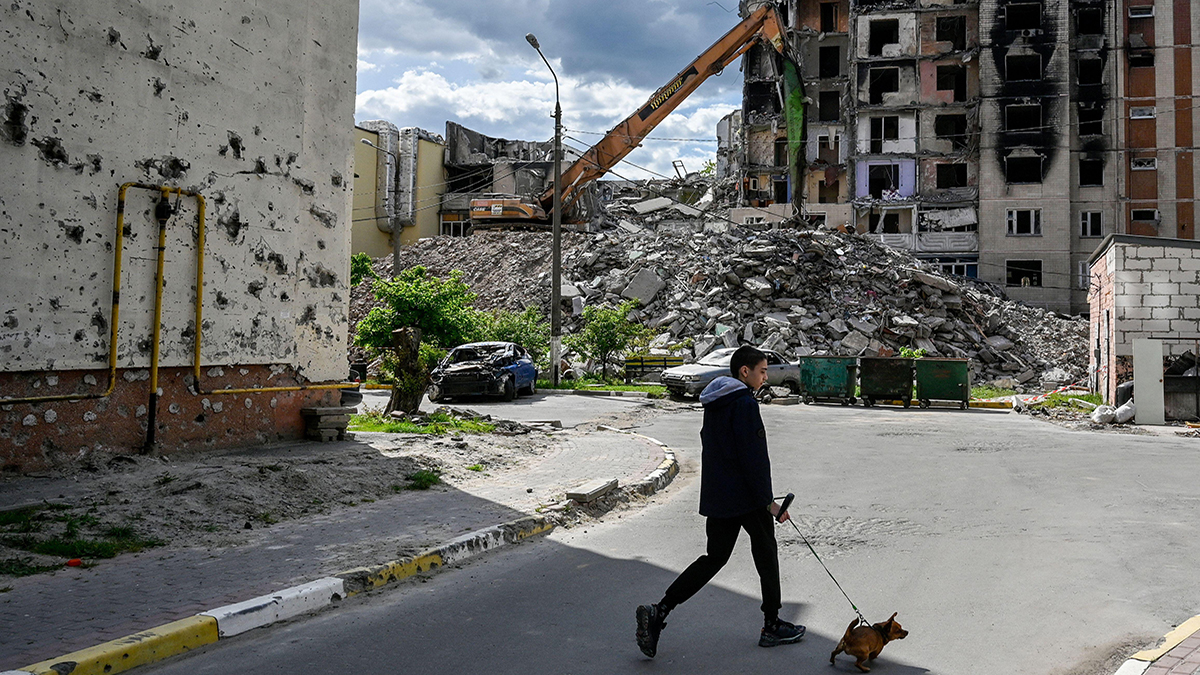Courage is contagious: the business of derisking Ukraine
Re/insurers joined the more than 1,000 public and private sector decision-makers at the Ukraine Recovery Conference
Insurance can help spur investors to rebuild the war-torn country’s economy
Ukraine’s recovery from Russian aggression offers an opportunity not only to repair what has been lost but also to rebuild an economy that is “more modern, more open, greener and more resilient”, the UK’s foreign secretary, James Cleverly, said as he opened the Ukraine Recovery Conference (URC) last week.
A repeated message before and during the forum, held in London, was that Ukraine needs an equivalent of the Marshall Plan, which helped rebuild Europe after World War II. The difference for Ukraine is that investment and re/insurance are being sought while that country is still at war.
At URC2023, Ukraine’s first deputy prime minister, Yulia Svyrydenko, called on the global re/insurance market to provide the country’s government and business community with war risk insurance cover.
Ukraine’s government “started thinking about war risk insurance about a year ago” and thus welcomes the UK’s launch of the London Conference Framework, Svyrydenko said.
In that vein, Marsh McLennan announced it will work with Ukraine’s government to design and deliver a risk data platform that will allow insurers to assess and underwrite war risks in the country “with greater confidence”.
More capacity needed
At URC2023, Svyrydenko was part of a panel discussion examining investment opportunities and derisking mechanisms to encourage private finance in Ukraine.
Svyrydenko said her country is playing its part in offering incentives to investors, such as the National Bank of Ukraine’s recent removal of certain foreign currency restrictions and allowing the servicing of insurance policies.
She highlighted how BlackRock’s launch of the Ukraine Development Fund (UDF), together with the Ukrainian government, will attract public and private capital to reconstruct Ukraine.
BlackRock and JPMorgan Chase are helping the Ukrainian government set up the reconstruction bank to steer public seed capital into rebuilding projects that can attract hundreds of billions of dollars in private investment. The UDF is not expected to fully launch until the end of hostilities with Russia.
Svyrydenko also referred to a memorandum of understanding signed during the conference by the European Bank for Reconstruction and Development (EBRD) and development finance institutions (DFIs) from around the world to provide a framework for collaboration when making co-investments in Ukraine, mainly in the private sector.
She then highlighted the announcement that the US International Development Finance Corporation (DFC) and the World Bank Group’s Multilateral Investment Guarantee Agency (Miga) had agreed to establish a consultative group to facilitate collaboration and co-ordination regarding their respective work in Ukraine.
Although Ukraine welcomes initiatives by all these organisations, Svyrydenko told her fellow panellists, existing mechanisms are “not enough”.
“We need to think about how we can increase capacity, how we can collaborate, to create a ’guarantee pool’, so as to be able to provide war risk insurance for companies willing to start the reconstruction and recovery of Ukraine, even during wartime,” she said.
Rebuilding in a new way
Another panellist, Philipp Hildebrand, vice-chairman of BlackRock, said the UDF is “not just about rebuilding but rebuilding in a new way”.
There needs to be “deal flow at scale”, which requires not merely money, but investable opportunities assessed through due diligence and governance that is “beyond reproach”, he said. The UDF is “very much a permanent institution” and “part of a future industrial strategy”, he added.
Pointing out BlackRock and JPMorgan Chase are American companies, Hildebrand said he would like to see European financial institutions supporting the UDF.
JPMorgan Chase has also been doing business in Ukraine for many years, raising capital for state and private companies.
“I remember Ukraine stepping in front of investors within two weeks of February 24, 2022, updating investors on what’s happening. That’s a great sign of how Ukraine is looking at private capital,” Stefan Weiler, head of central Europe, Middle East and Africa debt capital markets at JPMorgan Chase, told the panel.
“I remember Ukraine stepping in front of investors within two weeks of February 24, 2022, updating investors on what’s happening. That’s a great sign of how Ukraine is looking at private capital”
Stefan Weiler
JPMorgan Chase
As a partner in the UDF, JPMorgan Chase hopes to attract international finance institutions. “It may not be a preference for some institutions, but it’s a vehicle that can be very effective,” he said.
The most impactful statement of URC2023, Weiler continued, was from the president of the European Commission, Ursula von der Leyen.
“The fact the EU is looking to confiscate some of the assets that have been frozen from Russia. This is an opportunity to be creative and think about financing structures that can frontload some of those interest flows,” he said.
Opening doors
Sergiy Tsivkach, chief executive of UkraineInvest, highlighted other recent developments in Ukraine despite the difficulty of being a country at war. These include the National Bank of Ukraine’s recent removal of a restriction on repayment obligations for loans that are provided by export credit agencies (ECAs) and DFIs.
The Ukrainian parliament, he continued, has passed a draft law in its first reading that will allow the country’s ECA to provide investment insurance as well.
Its neighbours, too, are preparing the ground for insurance solutions, Tsivkach said, highlighting Poland is working on a draft law that aims to amend its Act on State-Guaranteed Export Insurance. The bill addresses the main barrier to investment in Ukraine by Polish entrepreneurs: inadequate protection of investments and capital.
Tsivkach highlighted the DFC’s launch in January of an initiative to mobilise $250m to boost access to capital for Ukrainian small and medium-sized enterprises (SMEs) during the war.
DFC chief executive, Scott Nathan, said such loan guarantees are a way of derisking investment, adding since 2014 the DFC has arranged almost $1bn of investment in Ukraine.
He referred to an announcement by the International Finance Corporation (IFC) and its partners of multiple new agreements that provide financial and advisory support to Ukraine’s private sector. A member of the World Bank Group, IFC is the largest global development institution focused on the private sector in emerging markets.
These agreements support the IFC’s $2bn Economic Resilience Action programme, launched last year. The IFC estimates Ukraine’s private sector could contribute about $140bn to the country’s reconstruction needs over the next 10 years.
To support Ukraine’s cross-border trade, the DFC, Miga and British International Investment (BII) have agreed to risk-share the IFC’s trade finance exposure.
“This is the first trade finance deal the DFC has ever done,” Nathan said, “so we’re stretching to find ways we can derisk.” The DFC’s $50m transaction will help mobilise “hundreds of millions of dollars” for trade finance, he added.
The need for reinsurance
Miga supports investments into emerging markets through guarantees and political risk insurance. Its role is particularly important in fragile and conflict-affected countries. Out of its $26bn portfolio, about $3.5bn is in such places.
Olga Sclovscaia, regional head of Europe and central Asia at Miga, told delegates to date the agency has insured $1.4bn of investments in Ukraine. Since the start of Russia’s invasion, Miga has been looking for ways to support the urgent needs of Ukrainian businesses.
Miga has issued $116m in guarantees, of which $10m was in support of trade finance with the EBRD and $100m of political risk insurance in support of its longstanding client in Ukraine, ProCredit Bank, which serves SMEs and the agribusiness sector.
Miga’s incremental coverage since the start of the war is $142m and, by the end of this year, it hopes to have underwritten around $250m in insurance coverage spread across trade finance, support for loans to SMEs and realty sector projects.
“Obviously, while these amounts are significant, the need for political risk insurance is massive, both now and in the future. And there are two critical pathways for Miga, to leverage our own capital and underwriting capacity to maximise our impact,” Sclovscaia said.
The EBRD, the biggest institutional investor in Ukraine, is new to war insurance, Alexander Pivovarsky, the EBRD’s director of capital and financial markets development, said.
Speaking from the audience of the panel discussion, Pivovarsky said the bank is also looking at ways to work with private reinsurers.
“For most countries that have suffered from such brutal war, there will be a lingering period of uncertainty and so whatever we can do to accelerate investment will be needed,” he said.
“We’ve specifically been working with donors to mobilise support for first-loss guarantees that could be used to reopen the insurance and reinsurance market, working with local insurance companies and with the potential administrators of this model that we hope to announce sometime soon. And we are working with the government of Ukraine to make sure there’s a policy framework for this to happen.”
Public-private partnership
Eric Andersen, president of Aon, said the firm, the largest insurance broker in Ukraine, views the country’s needs in two ways.
“We have a large operation on the ground that’s working today with businesses and communities in Ukraine already and there is a functioning insurance market without war or political violence cover, but it’s one-third smaller than it was a year ago. It continues to operate and provide traditional products to businesses and communities and individuals, but it needs capital,” Andersen said.
Ahead of URC2023, Aon announced its partnership with Austrian insurer Vienna Insurance Group and Lloyd’s, which will enable the provision of private reinsurance capital for political violence and political risk.
“The second question is: what does a public-private partnership look like?” Andersen said. Good examples, he said, include Terrorism Risk Insurance Act (Tria), which was established in the US after September 11, 2001, and the UK’s Pool Re.
“They are very different structures, but the goal was the same in terms of leveraging private capital behind public balance sheets until the private capital understands the risk and can price it appropriately and gain confidence,” Andersen said.
Diplomacy is key
Tsivkach said before Russia’s invasion, Ukraine had attracted a lot of interest from ECAs from around the world, but there had been no “significant announcements” in 2022 and 2023.
Asked what diplomats and foreign ministers can do to encourage ECAs to insure investments in Ukraine, Jan Lipavský, foreign minister of the Czech Republic, said: “It is our role to lead and to pave the way.” An example of progress for Ukraine from the international community, he said, is the Council of Europe’s agreement to have a register of damages.
“I could not imagine a debate one year ago on how private insurance companies and state-owned insurance companies will provide a service for business to do trade with Ukraine.”
Lipavský announced that, in a few weeks, the Czech Republic will launch a national guarantee and insurance agency to support insurance in trade exports to Ukraine.
One big deal
Rothschild & Co has been advising on $53bn of investments in Ukraine over the past 15 years, which means it has a direct insight into what investors are looking for, Giovanni Salvetti, head of the Commonwealth of Independent States region at the bank, said.
Those investors comprise three types, “the super-speculative, the brave and the mainstream”, he said. The focus now should be on the second type.
“I’m currently working on three transactions in excess of $100m with investors ready to consider investing in Ukraine in the next month. Not in paper, not in bonds, but in real assets. If there could be one big deal, which we can splash on the front page of the Financial Times then that will be worth more than a thousand conferences.
“In the last year-and-a-half, our Ukrainian friends have taught us many things. The one I think is the most valuable is that bravery is contagious. Not only in defending your homeland, but also in business. We need to get one or two case studies and then, I’m sure, we can create a stream.”
“In the last year-and-a-half, our Ukrainian friends have taught us many things. The one I think is the most valuable is that bravery is contagious. Not only in defending your homeland, but also in business”
Giovanni Salvetti
Rothschild & Co



